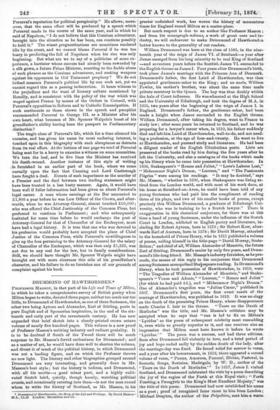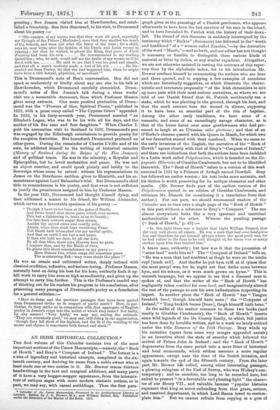DRUMMOND OF HAWTHORNDEN.'
PROFESSOR MASSON, in that part of his Life and Times of Milton, in which he takes a comprehensive survey of British poetry when Milton began to write, devoted three pages, neither too much nor too little, to Drummond of Hawthornden, as one of three Scotsmen, the -other two being Aytoun and Alexander, Earl of Stirling, poets in pure English and of Spenserian inspiration, in the end of the six- teenth and early part of the seventeenth century. He has now expanded that brief sketch into a closely-printed crown octavo volume of nearly five hundred pages. This volume is a new proof of Professor Masson's untiring industry and radiant geniality. It is to be doubted if South of the Tweed there will be much response to Mr. Masson's fervid enthusiasm for Drummond ; and as a matter of art, he would have done well to shorten the volume, and divest it of much of the political history, in which Drummond was not a leading figure, and on which the Professor throws no new light. The literary and other biographies grouped around Drummond are very interesting, and generally done in Mr. Masson's best style ; but the history is tedious, and Drummond, with all his merits—a good minor poet, and a highly culti- vated Scotch laird, quietly, though keenly, watching political events, and occasionally entering into them—is not the man round whom to write the history of Scotland, as Mr. Masson, in his * Drusnnsond of Haeothornden: the Story of his Life and Writings. By David Masson MA., LL.D London: Macmillan and Co.
greater unfinished work, has woven the history of momentous times for England round Milton as a centre-piece.
But much respect is due to an author like Professor Masson ; and from his monograph-volume, a work of great care and in- dustry, we will endeavour to make Drummond of Hawthornden better known to the generality of our readers.
William Drummond was born at the close of 1585, in the nine- teenth year of the reign of James VI. of Scotland—a year after James emerged from his long minority to be real King of Scotland —and seventeen years before the Scottish James VI. succeeded to the English throne as James I. Four years after Drummond's birth, took place James's marriage with the Princess Ann of Denmark. Drummond's father, the first Laird of Hawthornden, was then appointed gentleman-usher to the King ; and an uncle, William Fowler, his mother's brother, was about the same time made private secretary to the Queen. The boy was thus doubly within the halo of Court influence. He was educated at the High Sohool and the University of Edinburgh, and took the degree of M.A. in 1605, two years after the beginning of the reign of James I. in England. Drummond's father, the gentleman-usher, had been made a knight when James succeeded to the English throne. William Drummond, after taking his degree, went to France to study law ; after some years he returned to Scotland, and he was preparing for a lawyer's career when, in 1610, his father suddenly died and left him Laird of Hawthornden, well-to-do, and not need- ing a profession, at the age of four-and-twenty. He went to live at Hawthornden, and pursued study and literature. He had been a diligent reader of the English Elizabethan poets. Lists are preserved of the books read by him during the five years after he left the University, and also a catalogue of the books which made up his library when he came into possession at Hawthornden. In 1606, Shakespeare's " Romeo and Juliet," "Love's Labour Lost," "Midsummer Night's Dream, "Lucrece," and "The Passionate Pilgrim " were among his readings. " It may be doubted," says Mr. Masson, " whether in 1606, when Shakespeare was living re- tired from the London world, and with most of his work done, at his home at Stratford-on-Avon, he could have been told of any young Scotsman who had paid him the compliment of reading three of his plays, and two of his smaller books of poems, except precisely this William Drummond, a graduate of Edinburgh Uni- versity, who was in training to be a Scotch lawyer." There is exaggeration in this rhetorical conjecture, for there was at this time a band of young Scotsmen, under the influence of the Scotch Court in London, addicted to English poetry and literature, in- cluding Sir Robert Aytoun, born in 1570 ; Sir Robert Kerr, after- wards Earl of Ancram, born in 1578 ; Sir David Murray, attached to the household of Prince Henry, who in 1611 published a volume of poems, calling himself in the title-page " David Murray, Scoto- Briton ;" and chief of all, William Alexander of Menstrie, the future Earl of Stirling, Drummond's senior by only five years, and Drum- mond's life-long friend. Mr. Masson's industry furnishes, as be pro- ceeds, the means of this reply to his conjecture that Drummond among Scotsmen monopolised Shakespeare reading. In Drummond's library, when he took possession of Hawthornden, in 1610, were "The Tragedies of William Alexander of Menstrie," and Shake- speare's " Venus and Adonis," "Lucrece," " Romeo and Juliet" (for which he had paid 4d.), and "Midsummer Night's Dream." One of Alexander's tragedies was "Julius Caesar," published in 1607. Drummond's first poem, the first overt result of the musings of Hawthornden, was published in 1613. It was an elegy on the death of the promising Prince Henry, whose disappearance made Charles I. heir to the throne. " Tears on the Death of Mceliades " was the title, and Mr. Masson's criticism may be accepted when he says that " one is led to fix on Milton's Lycidas' as the poem of subsequent celebrity most resembling it, even while so greatly superior to it, and one receives also an impression that Milton must have known it before he wrote ' Lycidas.'" The poem was a success, and had three editions. Soon after Drummond fell violently in love, and a brief period of joy and hope ended sadly by the sudden death of the lady, after the marriage-day was fixed. He found relief for sorrow in verse, and a year after his bereavement, in 1616, there appeared a second volume of verse, " Poems, Amorous, Funeral, Divine, Pastoral, in Sonnets, Songs, Sextains, Madrigals, by W. D., author of the ' Tears on the Death of Mceliades.'" In 1617, James I. visited Scotland, and Drummond celebrated the visit by a poem describing the joy of the region of the Forth at this Royal visit ; " Forth Feasting, a Panegyric to the King's Most Excellent Majesty," was the title of this poem. Drummond had now established his name as a poet ; proof of recognised fame came to him from London ; Michael Drayton, the author of the Polyolbion, sent him a warm
greeting ; Ben Jonaon visited him at Hawthornden, and estab- lished a friendship. Ben thus discoursed, in his visit, to Drummond about his poetry :—
" 'His censure of my verses was that they were all good, especially my Epitaph of the Prince pfceliade,s], save that they smelled too much of the Schools, and were not after the fancy of the time ; for a child, says he may write after the fashion of the Greek and Latin verses in running : yet that he wished, to please the King, that piece of Forth Feasting had been his own. . . . . . He recommended to my reading Quintilian ; who, he said, would tell me the faults of my verses as if he
lived with me He said to me that I was too good and simple, and that oft a man's modesty made a fool of his wit He dis- suaded me from Poetry, for that she had beggared him, when he might have been a rich lawyer, physician, or merchant.'"
This is Drummond's note of Ben's conversation. Ben did not speak so moderately or kindly about any one else in his talk at Hawthornden, which Drummond carefully chronicled. Drum- mond's notes of Ben Jonson's talk during a three weeks' visit are a memorable document, from which Professor Masson gives many extracts. One more poetical production of Drum- mond was the " Flowers of Sion, Spiritual Poems," published in 1623, with a prose essay called "The Cypress Grove" appended.
In 1632, in his forty-seventh year, Drummond married " an Elizabeth Logan, who was to be his wife all his days, and the mother of his five sons and four daughters." When Charles I.
paid his coronation visit to Scotland in 1633, Drummond's pen was engaged by the Edinburgh entertainers to provide poetry for the reception festivities. But henceforth Drummond produced no other poem. During the remainder of Charles L's life and of his own, he addicted himself to the writing of historical memoirs (History of Scotland during the Reigns of the Five Jameses) and of political tracts. He was in the minority, a Royalist and Episcopalian, but he loved moderation and peace. He was not an abject courtier, and could speak plainly and boldly to the Sovereign whose cause he served : witness his representations to James on the Stratherne earldom given to Menteith, and his re- monstrance against Lord Balmerino's trial. But Drummond's chief title to remembrance is his poetry, and that even is not sufficient to justify the prominence assigned to him by Professor Masson.
In the year 1621, Drummond had thought himself dying, and then addressed a sonnet to his friend, Sir William Alexander, which serves as a favourable specimen of his poetry :—
" Though I have twice been at the gates of Death,
And twice found shut those gates which ever mourn, This but a lightening is, truce ta'en to breath ; For late-born sorrows augur fleet return.
Amidst thy sacred cares and courtly toils. Alexis, when thou shalt hear wandering Fame Tell Death hath triumphed o'er my mortal spoils, And that on earth I am but a sad name, If thou e'er held me dear, by all our love,
By all that bliss, those joys, Heaven here us gave,
I conjure thee, and by the Maids of Jove, To grave this short remembrance on my grave :— Hero Damon lies, whose songs did sometime grace The murmuring Esk : may roses shade the place I"
He was an ornate and cultivated writer, deeply imbued with classical erudition, reflective, and nature-loving. Professor Masson, naturally bent on doing his beat for his hero, evidently finds it up- hill work to carry him even so high as mediocrity, and gives up the attempt to carry him further. This is the Professor's candid way of thinking out for his readers his progress to his conclusions, after presenting many passages of Drummond's poetry as a foundation for a general criticism:—
" How do these and the previous passages that have been quoted from Drummond strike us in respect of poetic merit? How, in par- ticular, do they strike us in comparison with that aggregate of English poetry in James's reign into the midst of which they came? Not badly, by any means! ' Very fairly,' we may say, raising the estimate. 'They are extremely good,' we may say, still rising in our appreciation, 'though they fall short of the highest, and the fit of the wording to the metre and rhyme is sometimes both forced and slack."



































 Previous page
Previous page